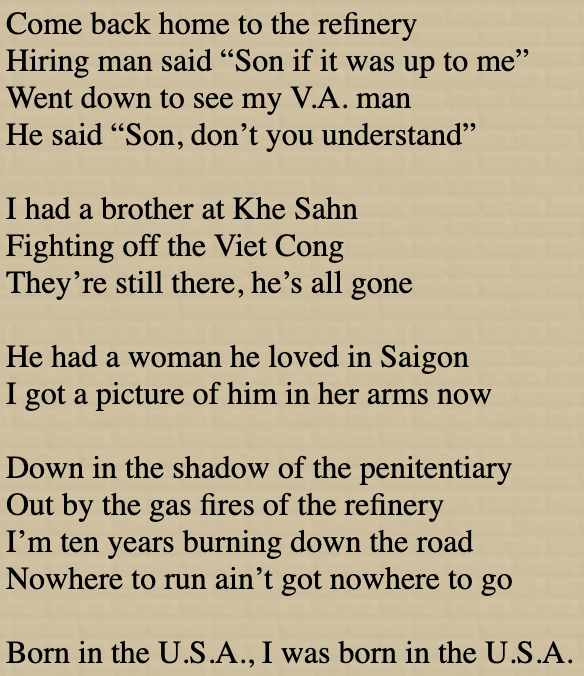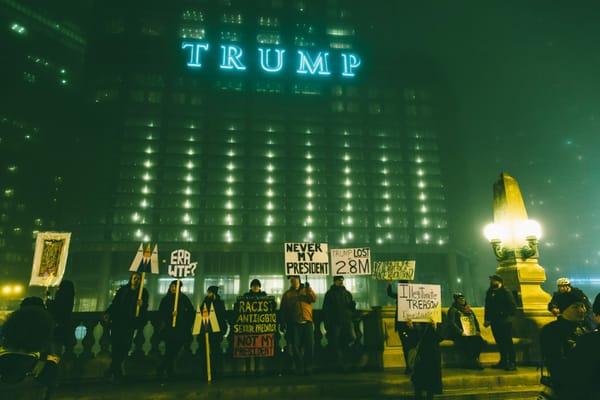Why 'Born in the USA' could be the soundtrack of America, again
In the north, south, the midwest, and the west—anywhere someone has ever felt like they were getting ripped off—"Born in the USA" spoke directly to the same disaffected white men who are voting for President Trump.

The first time I remember hearing Bruce Springsteen, I was a pre-teen. I'd already been through several phases of music fandom that didn't stick. This one did, even if my brother said he sounded like Meatloaf.
Even in the South, Springsteen is closely associated with New Jersey, but I could get Springsteen: A kid who wants to get out of their hometown in New Jersey sounds a lot like a kid who wants to get out of their hometown in the South.
The song was "Hungry Heart," which was a gateway to "Born to Run" and, eventually, "Born in the USA," Springsteen's record-breaking 1984 LP.

Sometimes the Boss's lyrics can be corny, but at his best, they are searing, specific. They speak the unspeakable. "Born in the USA" did that, hiding its barbs, broken-down towns, and desperate vets behind pop songwriting.
The album, which is Springsteen's most popular (if not his best) is 41 years old. But here's why it feels so right for 2025.
Abandoned places. Broken down carousels.
Right now, Springsteen's having a moment. This year, he's put out seven unreleased albums and one unreleased electric version of a classic. He picked a fight with President Trump and Trump picked one back.
There's a movie about Springsteen too, one that'll surprise some folks when they learn Springsteen's biggest hit, "Born in the USA," began as a folk dirge.
The guy doesn't need any more press, but the revival is fitting. Even at his most popular—and at times he's been very popular—Springsteen's best stories were about people without choices doing desperate things. Abandoned places. Broken-down carousels. Feels like there are a lot of those going around in 2025.
The narrator of his 1982 song "Johnny 99" killed a hotel clerk after losing his job and his home. "Now I ain't sayin' that make me an innocent man," Springsteen sang, "but it was more 'n all this that put that gun in my hand."
The title track of "Born in the USA" is his thesis. It's the song that captured the thing he wanted to say the most, and he never said it better.

It's the "they're still there, he's all gone" that gets me.
At the time of its release, then-President Reagan tried to co-opt it. Springsteen rebuffed him because Reagan, like so many, didn't get it. The best art is hard for political candidates to hold onto. It slips through their fingers.
Reagan's all gone now too, but his "Reaganomics"—his dream of untaxed, unregulated benevolent billionaires lavishing their riches down on the rest of us, of success "trickling down" to everyone else—still defines the modern Republican Party.
It could define a lot of Democrats too, or anyone who believes the wealthiest few can be trusted to do what's best for everyone else. It is one of the most important conflicts of our time, or of any time for that matter.
Disaffected white men
Springsteen was a guy who seemed to embody "the American dream," whatever that is or was, but whose songs centered on an alienated everyman. Sometimes corny, but never insincere.
There's an irony to that, a rich rock star inhabiting the character of the beaten-down. Even Springsteen noted it:
"I've never done any hard labor," he said during his 2017 Broadway run. "I've never worked nine to five. Standing before you is a man who has become wildly and absurdly successful writing about something of which he has had absolutely no personal experience. I made it all up."
Whether he made it all up or not, it resonated. In places in the north, south, the midwest, and the west, anywhere someone has ever felt like they were getting ripped off—which is everywhere—it spoke directly to the same disaffected white men who today are voting for President Trump, the Boss' nemesis.
A lot of folks are feeling alienated. Which is why "Born in the USA" might have been released in June 1984, but its betrayals and broken promises are right at home in 2025.
What made Springsteen great wasn't his songs or his image. It was his innate understanding of an abstract idea about America—that the American dream wasn't just a dream, it was a promise. There are a lot of people who say that promise wasn't kept.
That veteran in "Born in the USA?" The guy who lost his job in "Johnny 99?" That person getting beaten by a cop in "The Ghost of Tom Joad?"
They're still getting screwed.
Springsteen is an artist who understood, long before most pop stars, that trust in the American dream had been broken, and the road back to trust is perilous and uncertain.
He could have been talking about that road in his 1995 folk song "The Ghost of Tom Joad."
"The highway is alive tonight," Springsteen sang, "but nobody's kidding nobody about where it goes."
The Living South was created by journalist Billy Ball in 2025. It centers on the most interesting stories, thoughts, and people in the American South. Share this story with your friends and help The Living South grow.






